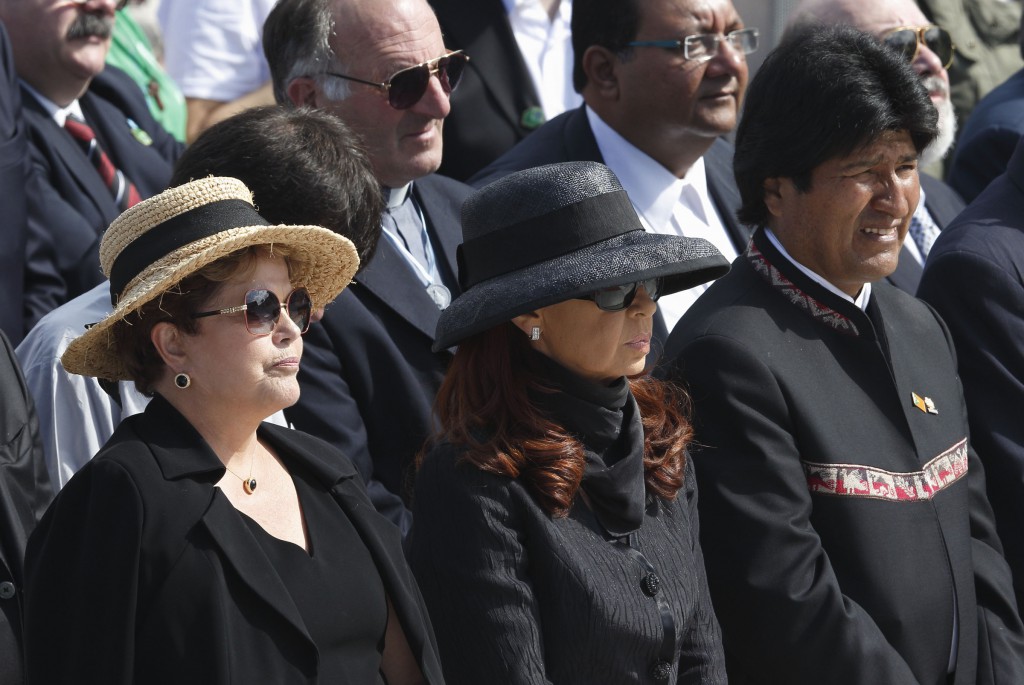
By Francis X. Rocca
Speaking to political, economic and cultural leaders in Brazil, a country recently shaken by anti-government protests, Pope Francis called for a “culture of encounter” and said dialogue is the only way to promote social peace.
The pope made his remarks July 27 in Rio’s Municipal Theater, to an audience representing what the Vatican’s official schedule described as the “ruling class of Brazil.”
“When leaders in various fields ask me for advice, my response is always the same: dialogue, dialogue, dialogue,” he said. “Today, either we stake all on dialogue, on the culture of encounter, or we all lose.”
The pope did not explicitly refer to the series of demonstrations in Brazilian cities that started last month, aimed at a range of grievances, including government corruption, unsatisfactory public education and health services, the high cost of public transportation and police brutality. But he pointed to dialogue as a third way “between selfish indifference and violent protest.”
“A country grows when constructive dialogue occurs between its many rich cultural components: popular culture, university culture, youth culture, artistic and technological culture, economic culture, family culture and media culture,” he said.
Pope Francis also called on his listeners to share “fraternal responsibility” for Brazilian society, “rehabilitating politics, which is one of the highest forms of charity.”
“The future demands of us a humanistic vision of the economy and a politics capable of ensuring greater and more effective participation on the part of all, eliminating forms of elitism and eradicating poverty,” he said.
Noting the importance of Christianity to the country’s cultural heritage, the pope said the church offered an “integral vision of the human person” that is “true to Brazilian identity and capable of building a better future for all.”
“Christianity combines transcendence and incarnation,” he said. “It brings ever new vitality to thought and life, in contrast to the dissatisfaction and disillusionment which creep into hearts and spread in the streets.”
Yet the pope endorsed the separation of church and state, historically a volatile topic in Latin America, where the Catholic Church long held a privileged legal position in many countries, but where it has more recently clashed with governments over issues, including abortion and same-sex marriage.
He said such separation favors “peaceful coexistence between different religions,” since the state, “without appropriating any one confessional stance, respects and esteems the presence of the religious factor in society, while fostering its concrete expressions.”
Before his remarks, the pope was greeted on the stage of the ornate century-old theater by Walmyr Junior, 28, a lay minister in the Archdiocese of Rio de Janeiro. He recounted his upbringing as an orphan in one of the city’s notorious “favelas,” or slums, his experience of drug abuse, and his recovery with the help of the church, which led to his graduation from the city’s Pontifical Catholic University.
Junior teared up before finishing his speech and embraced Pope Francis to loud applause from the audience.
Later, the pope greeted representatives of some indigenous Amazonian tribes appearing in their traditional dress, and briefly posed wearing a large feathered hat they gave him.
“The pope was saying what each one of us would have wanted to say if we had been on stage,” said a member of the audience, Alvaro Siviero, a concert pianist from Sao Paulo. “We saw there a person of common sense who didn’t speak in the way that is usual in politics.”
Siviero said the pope’s decision to address them in his native Spanish instead of the national language of Portuguese — for which he asked forgiveness at the start of his speech — was welcomed as a sign of humility.
“He wanted to talk to our hearts, not our minds only,” the pianist said. “His Spanish was from the heart, it was a universal language.” – CNS